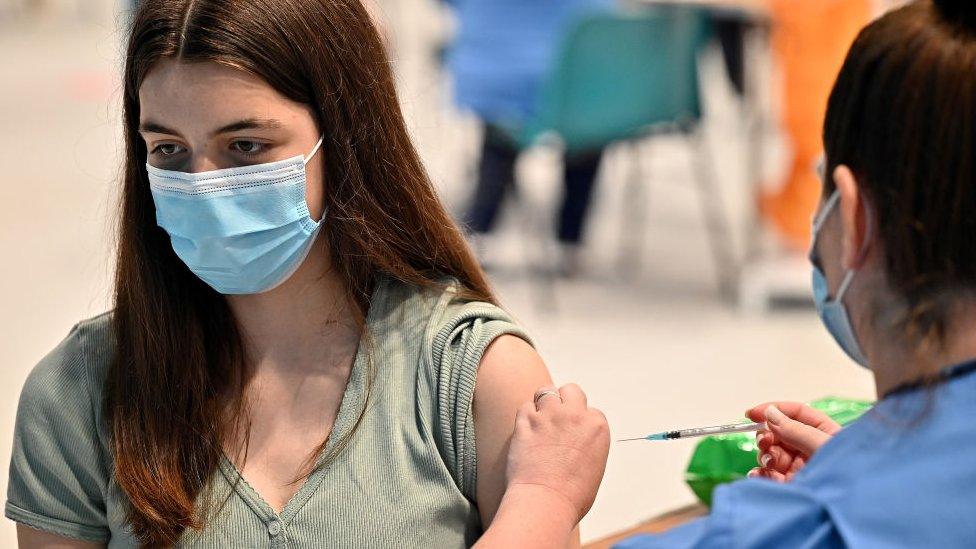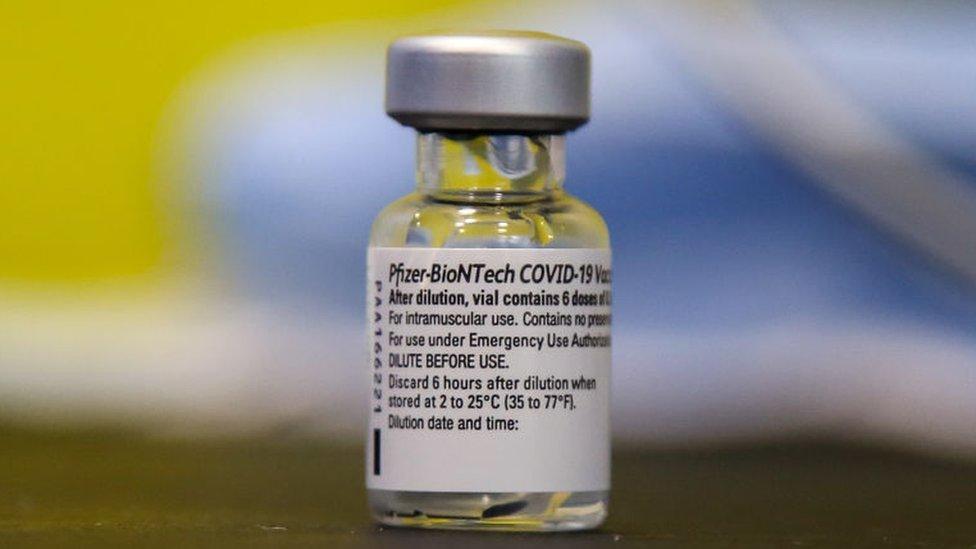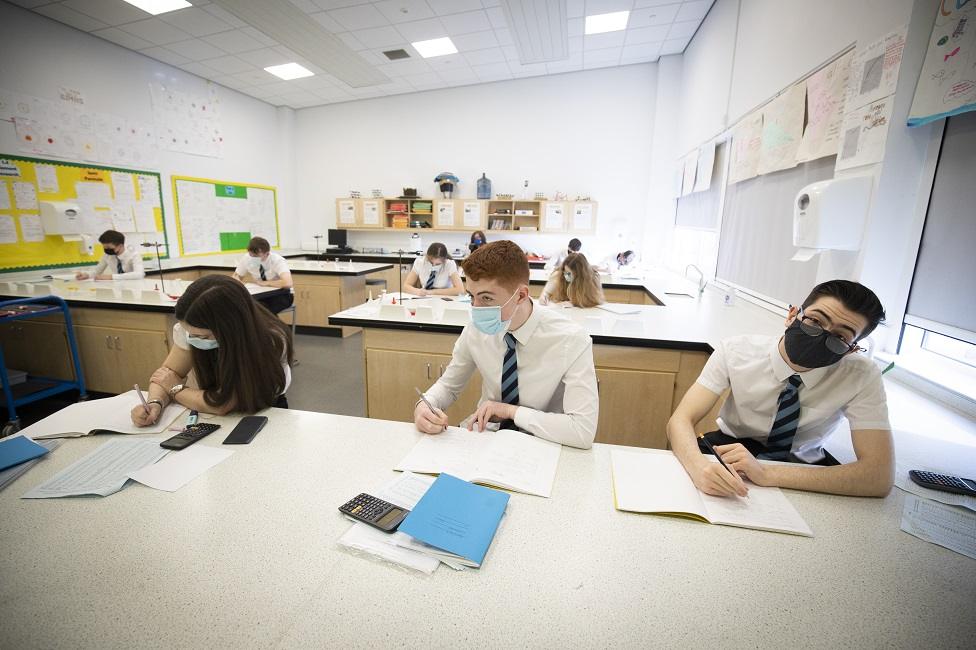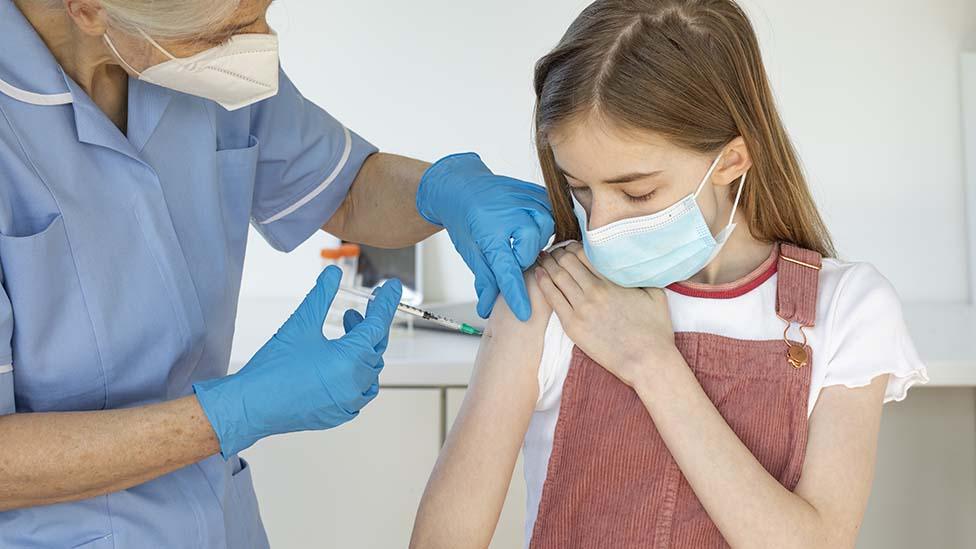Covid in Scotland: Shielders get 'lower vaccine protection'
- Published
- comments

People who were on the shielding list have lower protection against serious illness from Covid-19, even after two doses of vaccine, research has found.
Public Health Scotland and the University of Edinburgh published the study as a booster programme for vulnerable people and over 50s began.
Children aged 12 to 15 are also able to get a Covid vaccine in Scotland.
The injections for young teenagers will be available at drop-in centres and later in schools.
Older care home residents will be the first to be offered a booster jag.
The study found those classed as clinically extremely vulnerable had 66% protection against severe illness after two vaccine doses, compared with 93% protection in fully vaccinated people without any high-risk conditions.
Researchers said they hoped a third booster vaccine would increase protection levels further for those who had previously been asked to shield.
Of more than 3.5 million people who have had two vaccine doses in Scotland, the study found just 330 cases of severe Covid-19.
Almost half were in people whose health conditions meant they were classed as "extremely vulnerable". Most of the remainder were in people with more moderate risk conditions.
Prof Helen Colhoun, of the University of Edinburgh, said: "The fact that we see an increase in protection from the first to the second dose gives hope that a third dose might increase protection further."
Dr Nicholas Phin, director of public health science at Public Health Scotland, said: "The findings of this study confirm that all the vaccines approved for use in the UK continue to be highly effective at reducing severe illness and death from Covid-19.
"Whilst those who are clinically extremely vulnerable get, on average, a substantial level of protection to Covid-19, it will vary from person to person and by the nature of their vulnerability."
Booster programme
The booster shot of vaccine is being offered to all adults over 50, frontline health and care workers, younger adults with health conditions that put them at higher risk, and adult household contacts of people with suppressed immune systems.
The JCVI advisory group said the move was needed amid concern about waning immunity ahead of winter.
Residents in care homes for older people will be offered both flu and Covid booster vaccines.

Adults aged 70 years or over, and everyone aged over 16 on the highest risk list, will be contacted from the end of September either by letter or by their GP.
Other eligible groups - all adults over 50, all those aged 16 to 49 with underlying health conditions, adult carers, unpaid and young carers, and adult household contacts of people who are immunosuppressed - will be able to book online from October.
The booster dose can be given alongside the flu jab and should be offered no earlier than six months after completion of the primary vaccine course.
Health Secretary Humza Yousaf said: "The booster programme will run alongside our biggest ever flu vaccine programme as both of these programmes are important for individual and for public health and, wherever possible, those eligible will be offered Covid-19 booster and flu vaccines together."
'Avoiding educational disruption'
Youngsters in the 12 to 15-year-old age group will be sent vaccination invites by post from next week.
Mr Yousaf told BBC Radio's Good Morning Scotland programme that the government had prioritised community drop-ins over school vaccination programmes.
Drop-in clinics in Forth Valley, Lothian, Dumfries and Galloway, Tayside and Lanarkshire are accepting youngsters in this age group, with the remaining health boards expected to begin later in the week, once staff training in getting informed consent from 12 to 15-year-olds is complete.
The vaccination programme in schools will start after the scheduled appointments, but in some rural areas the vaccine will first be offered at school.
"We recognised that switching our drop-ins to 12 to 15-year-olds, with 12 to 15-year-olds being accompanied by an adult who can give verbal consent, is the quickest way to do this," he said.
"The more people we have, the greater the uptake amongst that population level, the better the outcomes in terms of avoiding educational disruption and, of course, for health reasons, not just for the individuals involved but for society as a whole."
It comes after the chief medical officers of each of the four UK nations concluded that the additional benefits were sufficient to justify vaccination of children over the age of 12.
They said it would help to reduce disruption to their schooling this winter and benefit those growing up in the poorest areas.

The chief medical officers said the vaccine programme will help reduce disruption in schools
All children aged 12 to 15 who are not already eligible will be offered a single dose of the Pfizer vaccine.
Those who have specific underlying conditions or disabilities are already covered by previous Joint Committee on Vaccination and Immunisation (JCVI) advice and will be offered two doses, eight weeks apart.
Bruce Adamson, Children and Young People's Commissioner Scotland, said it was "a strong rights-based decision" to give children the choice to get the vaccine.
He told BBC Scotland that children and young people had "borne the brunt" of the pandemic.
"They have played such an important role in protecting the public health of all of us, even though they're least likely to be affected.
"It should be a child's individual choice to take the vaccine - it needs to be an informed choice, based on how they feel and their understanding. There shouldn't be any pressure to take vaccination."
'Vaccinate the world'
Former prime minister Gordon Brown, the WHO ambassador for global health financing, said he believed the entire world could be vaccinated by next summer, if developed nations helped in the rollout elsewhere.
He said: "You can do the boosters in the UK, Europe and America, you can vaccinate 12 to 15-year-olds, you can retain some supplies in case of other emergencies, and still vaccinate the rest of the world."
He said there would be 500 million vaccines lying unused in rich nations by the end of next month and a billion by Christmas because of over ordering, and it would be "utterly unconscionable" to let those doses pass their use-by date when only 2% of Africa had been vaccinated.
Speaking on Good Morning Scotland, he said: "I believe that the whole world, all those adults who want a vaccination and we can get the vaccination to, can be vaccinated by next summer."
He said: "I believe that the plan that President Biden and others should agree, is that by December we get 40% of the world vaccinated, that's of the poorest countries, then by next spring we are up to 70%.
"That's the figure that people have settled on for the rest of the world - that's on top, of course, of the rich countries, our countries, already having 70% or more fully vaccinated at the moment."


Related topics
- Published29 November 2021
